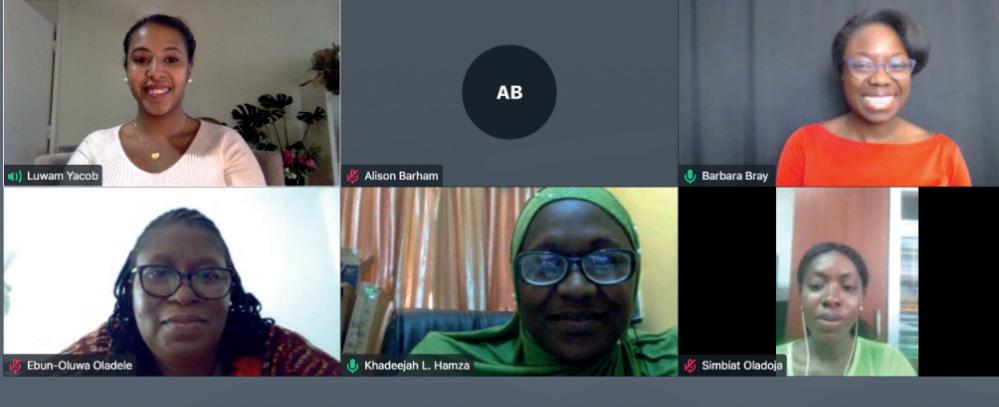
2 minute read
International Members Update
Barbara Bray MBE, Honorary Officer for International Affairs
As the pandemic forced Governments, organisations and citizens to look at health improvement, focus on nutrition and health increased worldwide.
One of the Society’s International objectives is to: “Lead or participate in special projects which have the potential of global impact”. In my role as Honorary Officer for International Affairs, it is within my remit to see how the Society can lend support to activities taking place internationally.
Living life in a pandemic has left many people feeling like their world has become smaller. It is all too easy to focus on your own experiences that the wider world becomes an afterthought – out of sight, out of mind.
Despite not being able to travel over the past year, I’ve used this time to connect with some international members online to hear about their experiences during this tremendously challenging and unusual time, and help them break out of this insular outlook.
The webinars are described below by the Society’s International Support Officer’s Luwam Yacob and Tracy Bogan.
Meeting one – Nigeria
The first in the series took place in November 2020, when Barbara spoke with some Nigerian members.
COVID-19 was highly disruptive to life in Nigeria at the time, with a sense of anxiety as the country was not equipped for a second lockdown. Public health projects stalled because funding was diverted to COVID-19, and patients were not being cared for in the community as a result. Having not been paid for six months, university staff began to strike with many resorting to finding any other employment available.
Inequality was increasing, yet members working in freelance nutrition talked of a boom in online business as wealthier people turned to them for nutrition advice on how to stay healthy.
Meeting two – Kenya
A few months later the stories from the members of Kenya were quite different. The advent of the vaccine rollouts was starting to be felt globally, restrictions were easing, the end of lockdowns was in sight and optimism was returning.
Issues like food shortages caused by travel restrictions between areas were less visible but the impact of the pandemic was still being felt. On the front-line, nutrition intervention services were seeing a low uptake as people were unable to access these services due to travel restrictions or were reluctant to take the risk of attending.
Academics and Nutrition students were also experiencing the many challenges faced by UK institutions such as adjusting to teaching online, and those with hospital placements were facing delays to completing their degrees.

Meeting three – Ghana
The most recent conversation took place at the end of May 2021 with members from Ghana. Life was gradually getting back to normal thanks to the vaccination programme and effective disease control procedures.
Travel restrictions had also been lifted although many non-essential businesses remained closed, and as stock levels struggled to keep up with demand, many had experienced delays in getting their second dose within the recommended 12 weeks’ timeframe.
Research had been impacted due to the travel restrictions and members were concerned of the long-term future of research as international funding opportunities had been negatively impacted, further exacerbated by Brexit.
It has been fascinating to learn about our international member experiences during this time alongside the many international milestones including the UN Committee for Food Security (CFS) launch, the UN Voluntary Guidelines for Food Systems and Nutrition, the State of Food Security and Nutriton in the world 2020 report and the State of School Feeding Worldwide Programme, all of which have made an impact to the wider international nutrition audience.
The increased poverty around the world has meant more people are dependent of the provision of school meals to ensure that their children receive food. The UK was one of many countries to review its school feeding programme for vulnerable children during the pandemic; an area that could benefit from resources provided by the Society to bring people together to share ideas and science. Looking ahead, a range of international nutrition improvement activities are taking place, including the UN Food Systems summit in September 2021. I look forward to being able to facilitate where the Nutrition Society can add value.










